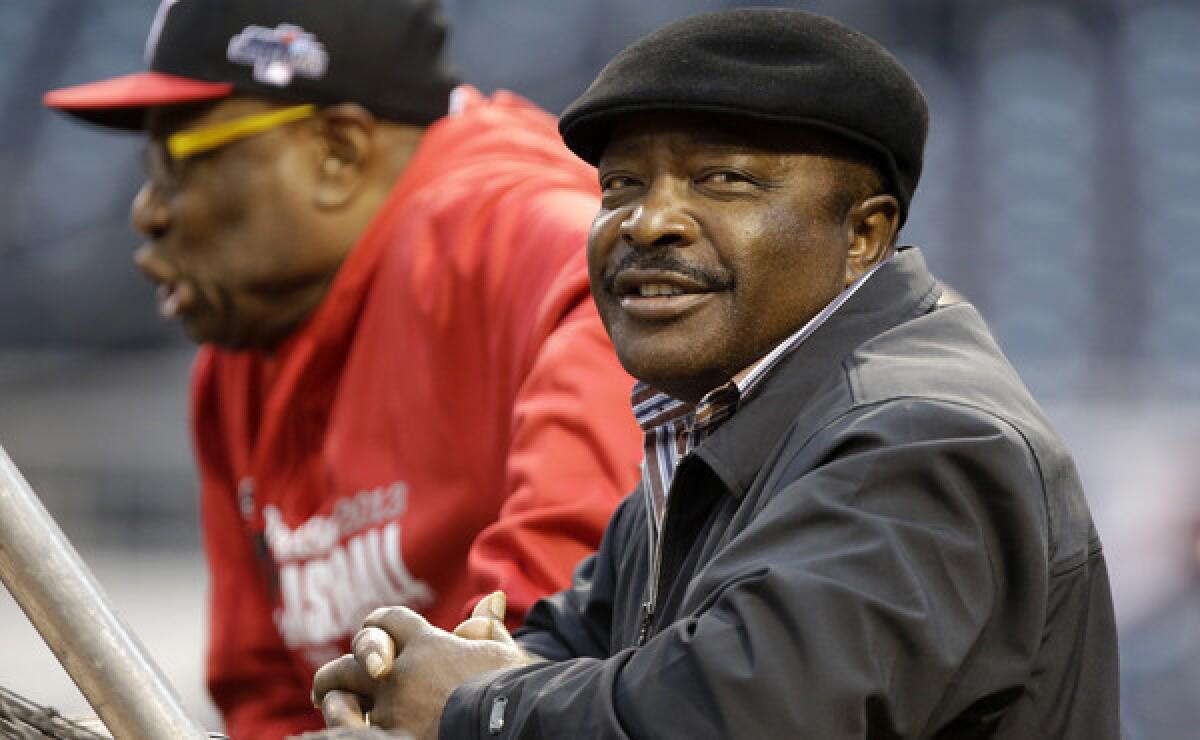Joe Morgan still has a lot to offer baseball

- Share via
Joe Morgan never retired from baseball. He just stopped playing in games.
He is 70, going on 45. What we remember — the left-handed batter swatting hits as easily as we swat flies — remains the essence of who he is and what he will always be.
He played in the majors from 1963 through 1984. Then he went immediately into a broadcasting career that bounced from his beloved Cincinnati Reds to stints with the San Francisco Giants, Oakland Athletics, ABC and, most prominently, ESPN’s “Sunday Night Baseball.” His talking career outlasted his playing career, 26 years to 21.
When ESPN cut the cord on him and broadcast partner Jon Miller in 2011, there was the possibility that the ever-present Morgan might fade from view.
Not so. Ideally, not ever. For as long as we can, we need to hear from the man rated among the best second basemen in the history of the game. He played in 10 All-Star games and was National League most valuable player in 1975 and 1976, when his Reds won the World Series each year. In 1990, he was inducted into the Hall of Fame, getting 82% of the vote.
He lives in Danville, Calif., and serves as a special advisor to the Reds’ head of baseball operations.
“I shouldn’t be on TV now,” he says. “I evaluate talent.”
He also does some community work and, when there is need, gets down on the field, rolls up his sleeves and instructs.
“I couldn’t be happier,” he says. “The broadcasting was great for the most part, but not so much the last few years.”
There were critics of his broadcasting, led by a website, firejoemorgan.com. Part of the anti-Morgan movement started because he is an outspoken critic of the sabermetric groups in baseball. Those folks favor computer analysis and statistical breakdowns for team personnel decisions and game strategy over human experience and time-tested moves.
That makes the prestigious award Morgan will receive Saturday night at Dennis Gilbert’s annual Professional Baseball Scouts Foundation dinner at the Hyatt Regency Century Plaza more fitting.
He will be honored with a Lifetime Achievement Award, and with a sideways swipe at the stats people, Morgan says there would be no award, much less lifetime achievement, were it not for baseball scouts.
“If I had to go into the draft right now,” he says, “I never would have gotten a chance. I was 5 foot 5, 140 pounds. No computer in the world would give me a look.
“Without a scout, a man named Bill Wight, I wouldn’t have gotten a shot.”
It is also interesting that he will be honored in a city that may still remember a home run he struck for the Giants on the final day of the 1982 regular season, knocking the Dodgers out of the playoffs.
“Everybody thinks I took a lot of satisfaction in that,” Morgan says, “but it wasn’t what people thought.”
The Dodgers had eliminated the Giants from the postseason the day before. Morgan connected against Terry Forster with two men on.
“It had been one of my favorite seasons ever,” Morgan says. “I just wanted to leave Giants fans with something happy, a high note.”
Throughout his career, Morgan had kept his emotions well in check. But when he rounded the bases that day, he flung his arms into the air in celebration.
“I had never done that before,” he says.
Morgan’s ongoing prominence in the game is enhanced by his current position as vice chairman of the board of directors of the Hall of Fame.
“We don’t vote, we set policy,” he says.
In the light of recent events, that may put Morgan and his fellow board members into some serious policy-setting discussions.
Recent Hall of Fame voting, conducted by tenured members of the Baseball Writers’ Assn. of America, has attracted much attention for the group’s rejection of several eligible players suspected of using performance-enhancing drugs. Clearly the likes of Barry Bonds, Roger Clemens and Mark McGwire would be in the Hall without PED clouds over their heads.
Then, this year, there was the uproar over Miami Herald writer Dan LeBatard’s giving his Hall of Fame vote to the website Deadspin, so its readers could vote. The BBWAA has taken away LeBatard’s vote for life.
(Full disclosures: 1. LeBatard was an intern at The Times in the late 1980s, when this typist was the sports editor. His recent action may point to a failure of proper schooling; 2. Times reporters who are members of the BBWAA, this typist included, are not allowed to vote in the Hall of Fame by newspaper policy, which says we should report the news, not make it. LeBatard’s foolishness is a good argument that this policy, disagreed on by most of the BBWAA members, including this one, may be correct.)
Morgan sees the LeBatard case as a silly aberration.
“The guy just wanted to call attention to himself,” he said, pointing to the new sad reality of sports journalism.
He sees the PED stalemate as much more serious.
“My only fear,” he says, “is that a lot of players now in the Hall of Fame will object strongly to PED guys getting in. I fear what the reception might be.”
He also fears that the BBWAA might look to his board to make a policy on the PED voting.
“It is what it is, one person, one ballot, one vote,” he says.
“It’s what makes America great.”
As do things such as 50 years of Joe Morgan in baseball.
More to Read
Go beyond the scoreboard
Get the latest on L.A.'s teams in the daily Sports Report newsletter.
You may occasionally receive promotional content from the Los Angeles Times.











